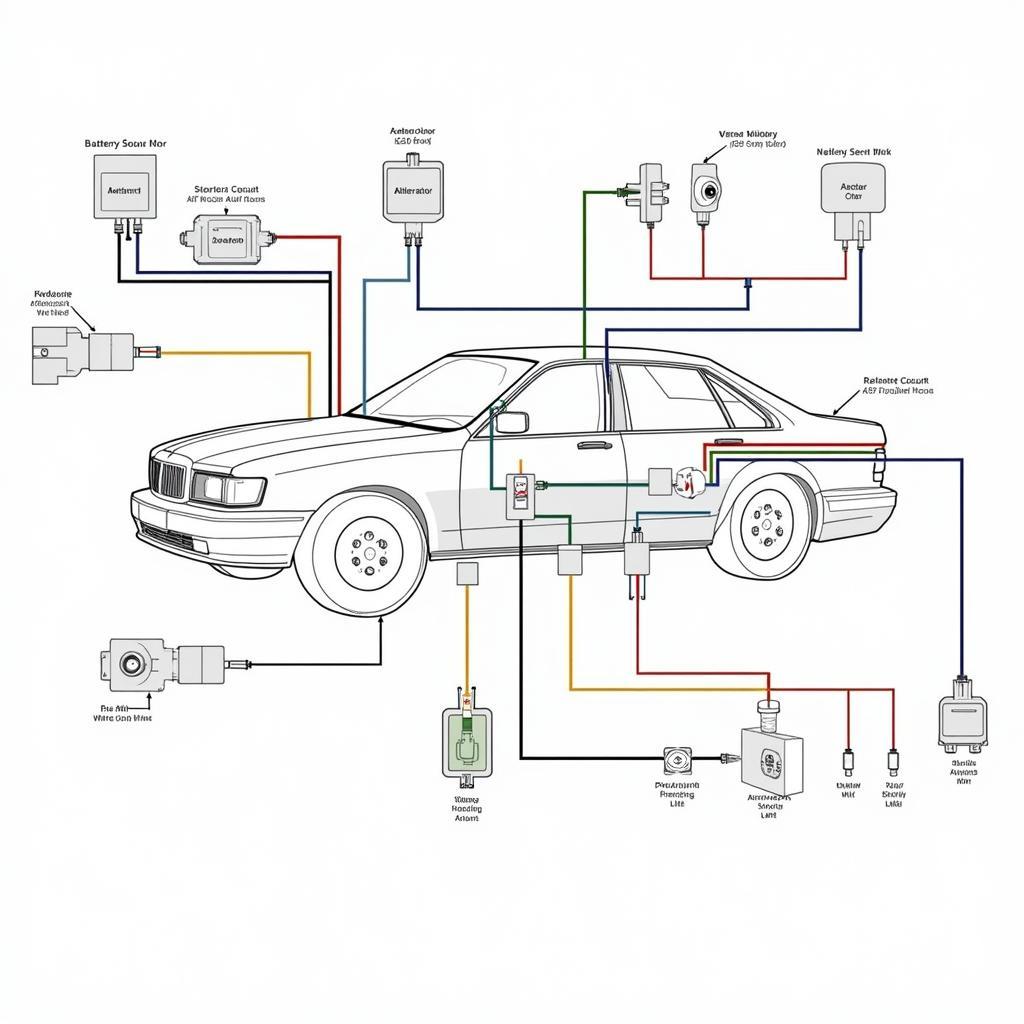The rapid advancement of driverless car technology presents exciting possibilities, but also raises complex Ethical Problems With Driverless Cars that demand careful consideration. From accident liability to algorithmic bias, the ethical dilemmas surrounding autonomous vehicles are multifaceted and require proactive solutions to ensure a safe and equitable future for this transformative technology. Let’s explore these challenges and potential solutions in greater detail.
problems with self driving cars news article
The Trolley Problem: A Modern Dilemma for Driverless Cars
The classic “Trolley Problem” thought experiment takes on a chilling reality with the advent of autonomous vehicles. Imagine a driverless car facing an unavoidable accident: swerve to avoid hitting a group of pedestrians and hit a single person, or stay on course and sacrifice the larger group? How should the car’s programming prioritize human life in such a split-second decision? This is one of the most discussed ethical problems with driverless cars. Who should make these life-or-death decisions: programmers, manufacturers, or regulators?
Programming Moral Machines: Whose Ethics Should Prevail?
Programming ethical decision-making into driverless cars requires defining and quantifying values, a task fraught with subjective interpretations and cultural variations. Should a car prioritize the safety of its occupants or the lives of those outside the vehicle? Whose ethical framework should guide these decisions? The complexities of translating human morality into algorithms pose a significant challenge.
Algorithmic Bias and Discrimination: Ensuring Fairness on the Road
Machine learning algorithms underpinning driverless car technology are trained on vast datasets, which can reflect and perpetuate existing societal biases. If these datasets disproportionately represent certain demographics, the resulting algorithms might exhibit biased behavior, potentially leading to discriminatory outcomes, such as failing to recognize pedestrians with darker skin tones or misinterpreting the movements of individuals with disabilities. This represents another ethical problems with driverless cars.
Addressing Bias in Autonomous Systems: The Need for Diverse Data
Mitigating algorithmic bias requires proactive measures. This includes ensuring diverse and representative datasets for training, implementing rigorous testing protocols to identify and rectify discriminatory outcomes, and fostering transparency in algorithmic development to allow for public scrutiny and accountability.
problems self driving cars must solve
Data Privacy and Security: Protecting Personal Information in a Connected World
Driverless cars generate massive amounts of data about driving habits, locations visited, and even conversations within the vehicle. This data presents valuable insights for improving autonomous systems, but also raises concerns about privacy and security. Who owns this data? How can we ensure its responsible use and prevent unauthorized access or misuse?
Balancing Innovation and Privacy: Safeguarding Data in the Age of Autonomous Vehicles
Establishing clear guidelines and regulations regarding data collection, storage, and usage is crucial. Implementing robust security measures to prevent data breaches and empowering individuals with control over their data are essential steps in balancing the benefits of data-driven improvements with the fundamental right to privacy.
Job Displacement and Economic Impact: Preparing for a Shifting Landscape
The widespread adoption of driverless cars has the potential to displace millions of professional drivers, impacting industries like trucking, taxi services, and public transportation. Addressing this potential job displacement requires proactive strategies for workforce retraining and economic diversification.
Navigating the Future of Work: Adapting to the Autonomous Revolution
Investing in education and training programs to equip workers with skills relevant to the evolving job market is essential. Exploring new economic models and social safety nets to support individuals affected by automation can help mitigate the negative consequences of job displacement.
“The ethical considerations surrounding autonomous vehicles are as complex as the technology itself,” states Dr. Emily Carter, a leading expert in artificial intelligence ethics at the Institute for Technological Futures. “We must engage in thoughtful discussions and develop robust frameworks to ensure that this transformative technology serves humanity’s best interests.”
cars for people with mobility problems
Liability and Accountability: Determining Responsibility in the Event of Accidents
Determining liability in accidents involving driverless cars presents unique legal and ethical challenges. If a driverless car causes an accident, who is responsible: the owner, the manufacturer, the software developer, or the car itself? Establishing clear legal frameworks for assigning responsibility is crucial for ensuring accountability and providing recourse for victims.
Establishing Legal Frameworks for Autonomous Vehicles: Defining Responsibility and Ensuring Justice
Developing a comprehensive legal framework for autonomous vehicles requires collaboration between legal experts, policymakers, and technology developers. This framework must address issues of liability, insurance, and compensation in a clear and consistent manner, ensuring that the legal system adapts to the complexities of autonomous technology.
problems self driving cars will create against humanity
technical problems with self driving cars
Conclusion: Navigating the Ethical Landscape of Driverless Cars
The ethical problems with driverless cars are complex and multifaceted, requiring careful consideration and proactive solutions. By addressing issues of algorithmic bias, data privacy, job displacement, and liability, we can harness the potential of autonomous vehicles while mitigating the risks. It’s crucial to engage in ongoing dialogue and collaboration to ensure that this transformative technology serves humanity’s best interests. Contact AutoTipPro at +1 (641) 206-8880 or visit our office at 500 N St Mary’s St, San Antonio, TX 78205, United States for more information and support.





Leave a Reply